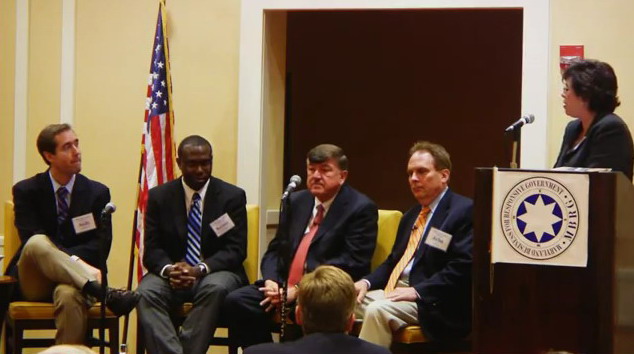By Margaret Sessa-Hawkins
In a compromise that could possibly move a stalled minimum wage hike out of committee, Senate Finance Chair Thomas Mac Middleton said he has been working on a potential agreement with the governor to raise the minimum wage to $10.10 over the next five years instead of three. This would also make it easier for the state to increase compensation for disability workers above the new minimum.
Middleton has been holding the House’s version of a minimum wage increase, HB295, back from a vote until he could pass his bill, SB890, to raise the pay for support staff for persons with developmentally disabilities to 50% above the minimum.
The Maryland Association of Community Services have been advocating for increasing their workers’ pay to 50% above the minimum wage, as called for in Middleton’s bill, but there are indications they might willing to settle for 35% above the new minimum wage.
Middleton raises concerns about attracting disability workers
The state currently pays disability workers $9.82 an hour, 35% higher than the current $7.25 per hour minimum wage. However, if the state raises the wage, the jobs could suddenly become minimum wage jobs, something Middleton’s bill aims to prevent.
“I know how important it is to our communities that our direct care workers that we entrust with a very, very vulnerable population provide this service,” Middleton said. “If you don’t have people that are attracted to this job because the wage is so low then you are not going to be able to attract the services that the state and I think our communities expect and want.”
The governor’s office said it would not comment on whether or not a proposal was being considered.
“We’ll let you know as soon as an agreement has been worked out, ” said O’Malley Press Secretary Nina Smith.
Advocates argue disability jobs are highly skilled
“These are not minimum wage jobs,” said Kathleen Durkin, president of the Maryland Association of Community Services. “These are high-skilled workers. There are extensive requirements to even be hired, and then they have almost a month worth of training.”
“We’re already facing tremendous turnover, tremendous vacancy rates, and if we then become competitive with minimum wage jobs we’re not going to find people,” Durkin said.
Over 200 individuals with developmental disabilities and their support staff showed up to a committee hearing Wednesday to make the point that they did not want to fall behind any general wage hike.
O’Malley chief of staff meets with group
After the hearing the group marched and wheeled to the State House to speak to Gov. O’Malley. O’Malley was not in the building, but his chief of staff, John Griffin, met with a few representatives of the group.
“We’re working hard to raise wages for everyone, including yourselves,” Griffin said. “We are in discussion with legislative leaders on the particular concerns you have about the level of increase in your workers’ salaries, and we are working hard to get that resolved with legislative leaders.”
However, enacting any wage hike for support staff will come at a price for the state. Raising workers’ salaries to 50% above the current minimum wage would cause expenditures for the Developmental Disabilities Administration to increase by an estimated $20 million dollars.
If the state minimum wage is raised, that number will rise significantly. When explaining his hesitations over SB890, O’Malley has pointed to the fact that the DDA has been given a budget increase of 54% over the past seven years, more than most other state agencies.






When the Governor points out that DDA funding has been increased by 54% in the last last seven years, it is not pointed out that this has mostly been targeted to dealing with the waiting list and students transitioning from education to adult services. One fairly recent study of the fiscal health of the providers in Maryland showed many with negative net worth. It appears the statement, perhaps accidentally, implies the state has enriched providers of care enough. Last ranking of percapita state funding of services for people with I/DD placed Maryland near the bottom. So I echo Vidi, kudos to Mac Middleton!
Kudos to Sen. Middleton for looking out for those who provide services to the most vulnerable among us. O’Malley says it will cost $20 million – out of a $39 BILLION budget. Take it out of the House of Cards tax credit. The developmentally disabled, I’m sure were not part of the conversation at the wine bar reception held by Kevin Spacey for our star-worshipping legislators.